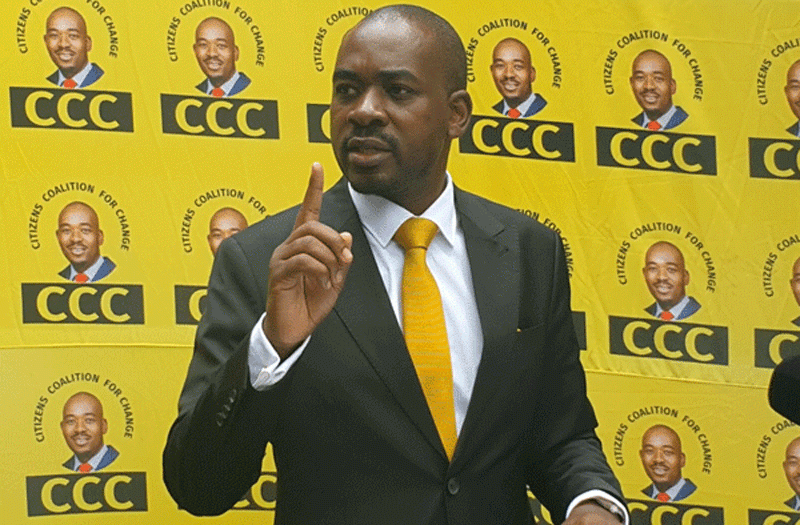
For nearly two decades, the opposition has been struggling to regain its foothold in Matabeleland after initially seizing control of the region in the 2000 elections. But the tide is turning if the outcome of the recent harmonised elections is anything to go by.
Zanu PF had dominated rural Matabeleland since 2013 and restricted the opposition MDC to urban areas such as Bulawayo, Beitbridge, Gwanda and Victoria Falls.
The Citizens Coalition for Change (CCC), which morphed from the MDC last year, won several council seats in rural Matabeleland South and North in addition to its traditional strongholds in the August 23 and 24 harmonised elections.
CCC led by Nelson Chamisa is now in charge of Tsholotsho, Mangwe and Hwange rural councils, a major milestone for the opposition.
Tsholotsho council chairman Rophas Ndlovu (CCC) took over the leadership mettle from Zanu PF after the opposition won 18 council seats out of a total of 29 in the district.
These also include the women’s quota where Zanu PF had 11 councillors in the previous elections.
Ndlovu said the councilors will try to unite the people of Tsholotsho after years of polarisation, which he blamed on Zanu PF.
“We will be inclusive, involving all the communities in decision making,” he said.
- Chamisa under fire over US$120K donation
- Mavhunga puts DeMbare into Chibuku quarterfinals
- Pension funds bet on Cabora Bassa oilfields
- Councils defy govt fire tender directive
Keep Reading
“Zanu PF has polarised our communities by propagating hate speech and fear for a long time.
“As a team we will focus on our priorities that include water and sanitation for all as well as improve educational results for our children.
“We will also improve drainage in the town centre and the refurbishment of the bus terminal at the business centre.”
Ndlovu said the councillors would ensure a clean environment in Tsholotsho town by engaging partners and other stakeholders including non-government organisations (NGOs) in finding solutions to their challenges.
According to Ndlovu, council will also engage youths for income generating projects like bee keeping, fish farming and mushroom farming.
He said council would also also improve the welfare of old and vulnerable people in the communities by engaging them in small projects like weaving and basket making.
The Hwange rural council chairman Pasca Mpofu leads the local authority with 26 councillors, 12 from both Zanu PF and CCC. There is also MDC councillor and an independent.
Mpofu was elected after 17 councillors voted for him.
“Our main focus would be to make sure that residents get clean water by sinking more boreholes,” he said.
“We are close to the Zambezi River, but villagers do not have access to clean water.”
He said villagers depend on Zimbabwe Power Company (ZPC) which pumps its water from the Zambezi River and they get access the water from the pipes.
“What is shocking is that ward 10, which covers the Zambezi River area is always hit by water challenges yet they are so close to water source,” Mpofu said.
“ZPC has allowed villagers to also benefit from its piping system, but ward 10 has no access to the water.”
Mpofu believes the government should intervene to make sure that coal mining companies in Hwange take corporate social responsibility seriously so that communities can benefit from the natural resources.
He said council would also build more schools so that those in the lower classes would be saved from walking long distances.
“The annexes would be for up to Grade 5 then after that they will join the main schools,” Mpofu added.
Zanu PF politburo member in Matabeleland North, Headman Moyo blamed the ruling party’s loss in the province on complacency.
“We became complacent and failed to do our ground work properly. There were some mistakes but come 2028 we will win because we have already started campaigning,” he said.
Moyo said even though CCC appeared to have gained the ground, Zanu PF numbers in Binga had increased tremendously.
“They used to dominate, but we made some significant strides. Remember, in 2000, we lost in all constituencies. We won Umguza in the next elections,” he said.
“Our graph has increased as we also took some in some senatorial seats.”
Bulawayo-based political analyst Effie Ncube said the CCC achievements were massive in view of the notion that rural areas were considered to be Zanu-PF strongholds.
“This is significant also in that they took these areas away from the ruling party and under a very difficult and highly restrictive campaign environment,” Ncube said.
“It shows that in truly free and fair elections these achievements can be replicated throughout the country.”







